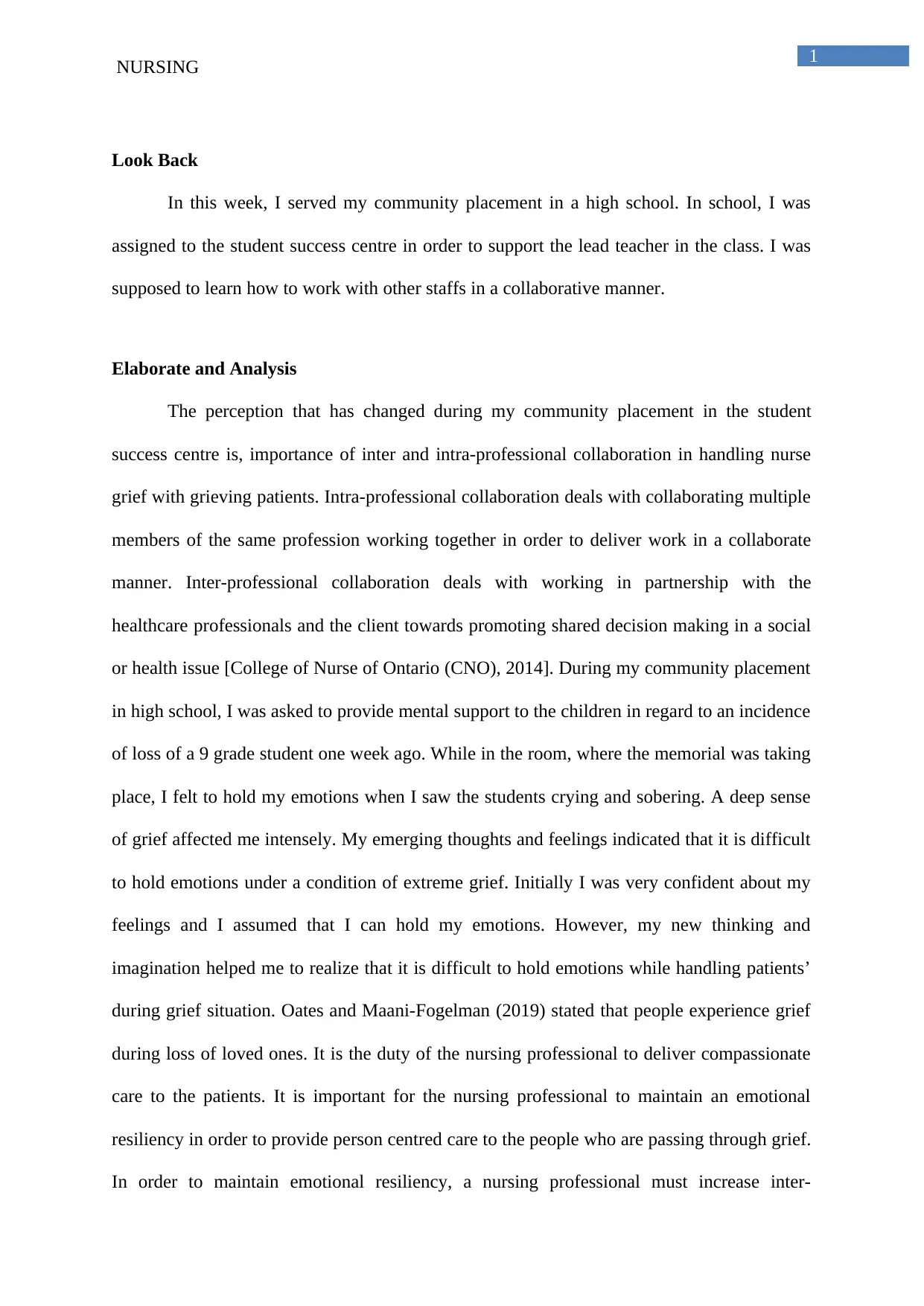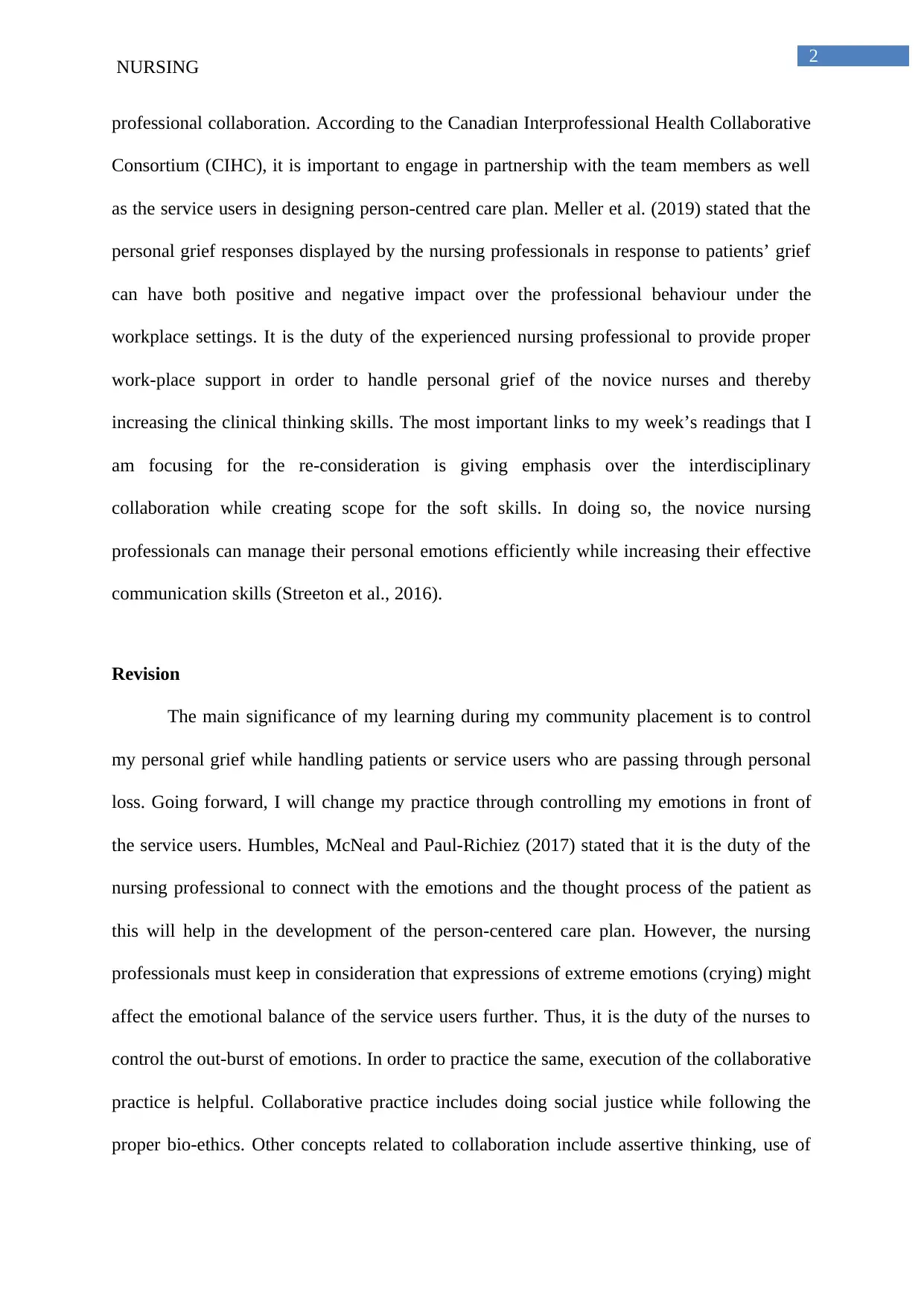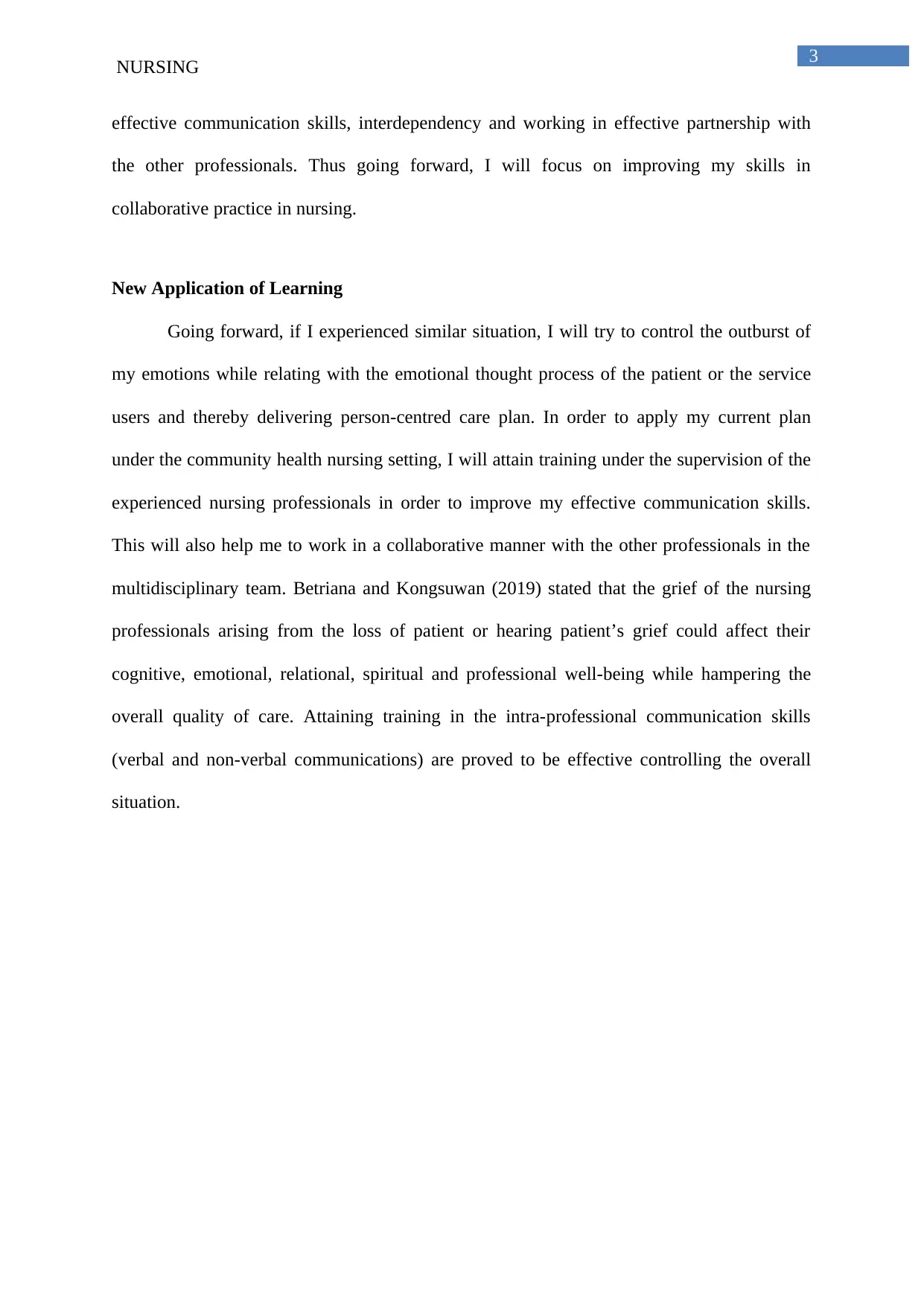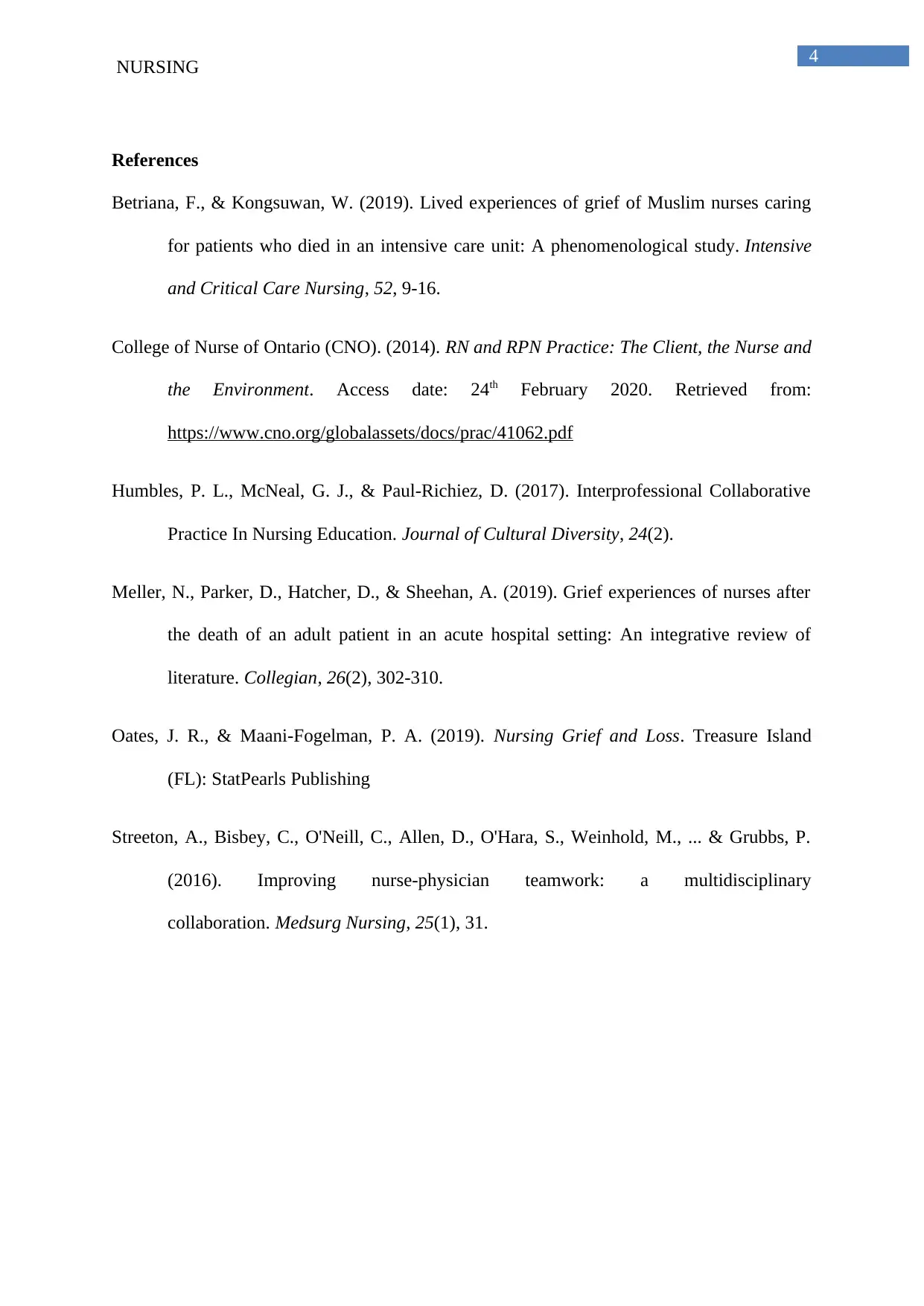Community Placement: Nursing Reflection on Grief and Collaboration
VerifiedAdded on 2022/08/11
|5
|1169
|24
Journal and Reflective Writing
AI Summary
This reflective journal entry details a nursing student's experience during a community placement in a high school, where they were tasked with supporting students following the loss of a classmate. The student reflects on their personal emotional response to witnessing the students' grief and the challenges of managing their own emotions while providing care. The paper explores the importance of interprofessional and intraprofessional collaboration in handling grief, referencing relevant literature on emotional resilience, person-centered care, and the impact of nurses' grief responses. The student discusses how they will revise their practice to better control their emotions and improve their collaborative skills, including training in communication and teamwork. The assignment concludes with a discussion of how the new learning will be applied in future scenarios.

Running head: NURSING
Nursing
Name of the Student
Name of the University
Author Note
Nursing
Name of the Student
Name of the University
Author Note
Paraphrase This Document
Need a fresh take? Get an instant paraphrase of this document with our AI Paraphraser

1
NURSING
Look Back
In this week, I served my community placement in a high school. In school, I was
assigned to the student success centre in order to support the lead teacher in the class. I was
supposed to learn how to work with other staffs in a collaborative manner.
Elaborate and Analysis
The perception that has changed during my community placement in the student
success centre is, importance of inter and intra-professional collaboration in handling nurse
grief with grieving patients. Intra-professional collaboration deals with collaborating multiple
members of the same profession working together in order to deliver work in a collaborate
manner. Inter-professional collaboration deals with working in partnership with the
healthcare professionals and the client towards promoting shared decision making in a social
or health issue [College of Nurse of Ontario (CNO), 2014]. During my community placement
in high school, I was asked to provide mental support to the children in regard to an incidence
of loss of a 9 grade student one week ago. While in the room, where the memorial was taking
place, I felt to hold my emotions when I saw the students crying and sobering. A deep sense
of grief affected me intensely. My emerging thoughts and feelings indicated that it is difficult
to hold emotions under a condition of extreme grief. Initially I was very confident about my
feelings and I assumed that I can hold my emotions. However, my new thinking and
imagination helped me to realize that it is difficult to hold emotions while handling patients’
during grief situation. Oates and Maani-Fogelman (2019) stated that people experience grief
during loss of loved ones. It is the duty of the nursing professional to deliver compassionate
care to the patients. It is important for the nursing professional to maintain an emotional
resiliency in order to provide person centred care to the people who are passing through grief.
In order to maintain emotional resiliency, a nursing professional must increase inter-
NURSING
Look Back
In this week, I served my community placement in a high school. In school, I was
assigned to the student success centre in order to support the lead teacher in the class. I was
supposed to learn how to work with other staffs in a collaborative manner.
Elaborate and Analysis
The perception that has changed during my community placement in the student
success centre is, importance of inter and intra-professional collaboration in handling nurse
grief with grieving patients. Intra-professional collaboration deals with collaborating multiple
members of the same profession working together in order to deliver work in a collaborate
manner. Inter-professional collaboration deals with working in partnership with the
healthcare professionals and the client towards promoting shared decision making in a social
or health issue [College of Nurse of Ontario (CNO), 2014]. During my community placement
in high school, I was asked to provide mental support to the children in regard to an incidence
of loss of a 9 grade student one week ago. While in the room, where the memorial was taking
place, I felt to hold my emotions when I saw the students crying and sobering. A deep sense
of grief affected me intensely. My emerging thoughts and feelings indicated that it is difficult
to hold emotions under a condition of extreme grief. Initially I was very confident about my
feelings and I assumed that I can hold my emotions. However, my new thinking and
imagination helped me to realize that it is difficult to hold emotions while handling patients’
during grief situation. Oates and Maani-Fogelman (2019) stated that people experience grief
during loss of loved ones. It is the duty of the nursing professional to deliver compassionate
care to the patients. It is important for the nursing professional to maintain an emotional
resiliency in order to provide person centred care to the people who are passing through grief.
In order to maintain emotional resiliency, a nursing professional must increase inter-

2
NURSING
professional collaboration. According to the Canadian Interprofessional Health Collaborative
Consortium (CIHC), it is important to engage in partnership with the team members as well
as the service users in designing person-centred care plan. Meller et al. (2019) stated that the
personal grief responses displayed by the nursing professionals in response to patients’ grief
can have both positive and negative impact over the professional behaviour under the
workplace settings. It is the duty of the experienced nursing professional to provide proper
work-place support in order to handle personal grief of the novice nurses and thereby
increasing the clinical thinking skills. The most important links to my week’s readings that I
am focusing for the re-consideration is giving emphasis over the interdisciplinary
collaboration while creating scope for the soft skills. In doing so, the novice nursing
professionals can manage their personal emotions efficiently while increasing their effective
communication skills (Streeton et al., 2016).
Revision
The main significance of my learning during my community placement is to control
my personal grief while handling patients or service users who are passing through personal
loss. Going forward, I will change my practice through controlling my emotions in front of
the service users. Humbles, McNeal and Paul-Richiez (2017) stated that it is the duty of the
nursing professional to connect with the emotions and the thought process of the patient as
this will help in the development of the person-centered care plan. However, the nursing
professionals must keep in consideration that expressions of extreme emotions (crying) might
affect the emotional balance of the service users further. Thus, it is the duty of the nurses to
control the out-burst of emotions. In order to practice the same, execution of the collaborative
practice is helpful. Collaborative practice includes doing social justice while following the
proper bio-ethics. Other concepts related to collaboration include assertive thinking, use of
NURSING
professional collaboration. According to the Canadian Interprofessional Health Collaborative
Consortium (CIHC), it is important to engage in partnership with the team members as well
as the service users in designing person-centred care plan. Meller et al. (2019) stated that the
personal grief responses displayed by the nursing professionals in response to patients’ grief
can have both positive and negative impact over the professional behaviour under the
workplace settings. It is the duty of the experienced nursing professional to provide proper
work-place support in order to handle personal grief of the novice nurses and thereby
increasing the clinical thinking skills. The most important links to my week’s readings that I
am focusing for the re-consideration is giving emphasis over the interdisciplinary
collaboration while creating scope for the soft skills. In doing so, the novice nursing
professionals can manage their personal emotions efficiently while increasing their effective
communication skills (Streeton et al., 2016).
Revision
The main significance of my learning during my community placement is to control
my personal grief while handling patients or service users who are passing through personal
loss. Going forward, I will change my practice through controlling my emotions in front of
the service users. Humbles, McNeal and Paul-Richiez (2017) stated that it is the duty of the
nursing professional to connect with the emotions and the thought process of the patient as
this will help in the development of the person-centered care plan. However, the nursing
professionals must keep in consideration that expressions of extreme emotions (crying) might
affect the emotional balance of the service users further. Thus, it is the duty of the nurses to
control the out-burst of emotions. In order to practice the same, execution of the collaborative
practice is helpful. Collaborative practice includes doing social justice while following the
proper bio-ethics. Other concepts related to collaboration include assertive thinking, use of
⊘ This is a preview!⊘
Do you want full access?
Subscribe today to unlock all pages.

Trusted by 1+ million students worldwide

3
NURSING
effective communication skills, interdependency and working in effective partnership with
the other professionals. Thus going forward, I will focus on improving my skills in
collaborative practice in nursing.
New Application of Learning
Going forward, if I experienced similar situation, I will try to control the outburst of
my emotions while relating with the emotional thought process of the patient or the service
users and thereby delivering person-centred care plan. In order to apply my current plan
under the community health nursing setting, I will attain training under the supervision of the
experienced nursing professionals in order to improve my effective communication skills.
This will also help me to work in a collaborative manner with the other professionals in the
multidisciplinary team. Betriana and Kongsuwan (2019) stated that the grief of the nursing
professionals arising from the loss of patient or hearing patient’s grief could affect their
cognitive, emotional, relational, spiritual and professional well-being while hampering the
overall quality of care. Attaining training in the intra-professional communication skills
(verbal and non-verbal communications) are proved to be effective controlling the overall
situation.
NURSING
effective communication skills, interdependency and working in effective partnership with
the other professionals. Thus going forward, I will focus on improving my skills in
collaborative practice in nursing.
New Application of Learning
Going forward, if I experienced similar situation, I will try to control the outburst of
my emotions while relating with the emotional thought process of the patient or the service
users and thereby delivering person-centred care plan. In order to apply my current plan
under the community health nursing setting, I will attain training under the supervision of the
experienced nursing professionals in order to improve my effective communication skills.
This will also help me to work in a collaborative manner with the other professionals in the
multidisciplinary team. Betriana and Kongsuwan (2019) stated that the grief of the nursing
professionals arising from the loss of patient or hearing patient’s grief could affect their
cognitive, emotional, relational, spiritual and professional well-being while hampering the
overall quality of care. Attaining training in the intra-professional communication skills
(verbal and non-verbal communications) are proved to be effective controlling the overall
situation.
Paraphrase This Document
Need a fresh take? Get an instant paraphrase of this document with our AI Paraphraser

4
NURSING
References
Betriana, F., & Kongsuwan, W. (2019). Lived experiences of grief of Muslim nurses caring
for patients who died in an intensive care unit: A phenomenological study. Intensive
and Critical Care Nursing, 52, 9-16.
College of Nurse of Ontario (CNO). (2014). RN and RPN Practice: The Client, the Nurse and
the Environment. Access date: 24th February 2020. Retrieved from:
https://www.cno.org/globalassets/docs/prac/41062.pdf
Humbles, P. L., McNeal, G. J., & Paul-Richiez, D. (2017). Interprofessional Collaborative
Practice In Nursing Education. Journal of Cultural Diversity, 24(2).
Meller, N., Parker, D., Hatcher, D., & Sheehan, A. (2019). Grief experiences of nurses after
the death of an adult patient in an acute hospital setting: An integrative review of
literature. Collegian, 26(2), 302-310.
Oates, J. R., & Maani-Fogelman, P. A. (2019). Nursing Grief and Loss. Treasure Island
(FL): StatPearls Publishing
Streeton, A., Bisbey, C., O'Neill, C., Allen, D., O'Hara, S., Weinhold, M., ... & Grubbs, P.
(2016). Improving nurse-physician teamwork: a multidisciplinary
collaboration. Medsurg Nursing, 25(1), 31.
NURSING
References
Betriana, F., & Kongsuwan, W. (2019). Lived experiences of grief of Muslim nurses caring
for patients who died in an intensive care unit: A phenomenological study. Intensive
and Critical Care Nursing, 52, 9-16.
College of Nurse of Ontario (CNO). (2014). RN and RPN Practice: The Client, the Nurse and
the Environment. Access date: 24th February 2020. Retrieved from:
https://www.cno.org/globalassets/docs/prac/41062.pdf
Humbles, P. L., McNeal, G. J., & Paul-Richiez, D. (2017). Interprofessional Collaborative
Practice In Nursing Education. Journal of Cultural Diversity, 24(2).
Meller, N., Parker, D., Hatcher, D., & Sheehan, A. (2019). Grief experiences of nurses after
the death of an adult patient in an acute hospital setting: An integrative review of
literature. Collegian, 26(2), 302-310.
Oates, J. R., & Maani-Fogelman, P. A. (2019). Nursing Grief and Loss. Treasure Island
(FL): StatPearls Publishing
Streeton, A., Bisbey, C., O'Neill, C., Allen, D., O'Hara, S., Weinhold, M., ... & Grubbs, P.
(2016). Improving nurse-physician teamwork: a multidisciplinary
collaboration. Medsurg Nursing, 25(1), 31.
1 out of 5
Related Documents
Your All-in-One AI-Powered Toolkit for Academic Success.
+13062052269
info@desklib.com
Available 24*7 on WhatsApp / Email
![[object Object]](/_next/static/media/star-bottom.7253800d.svg)
Unlock your academic potential
Copyright © 2020–2026 A2Z Services. All Rights Reserved. Developed and managed by ZUCOL.





